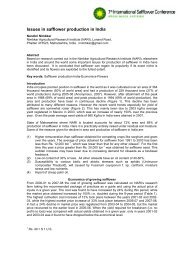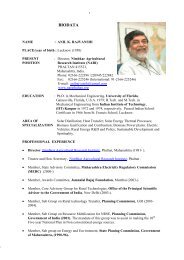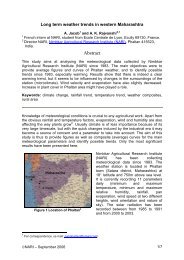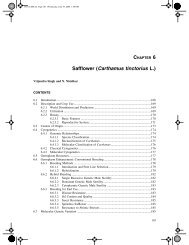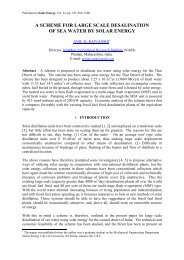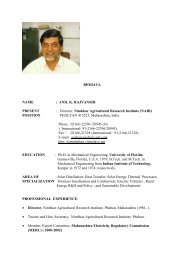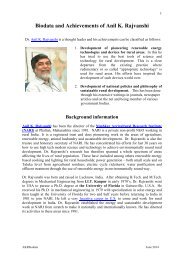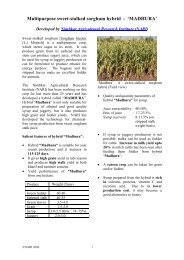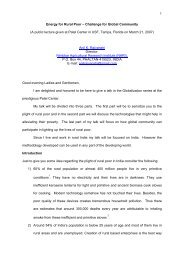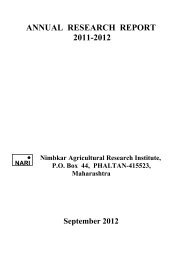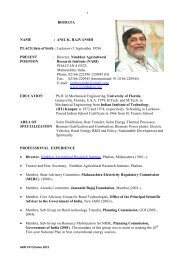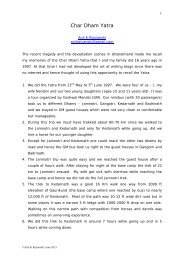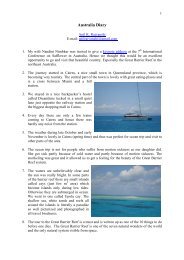The three minds of body - Brain, heart and gut - NARI
The three minds of body - Brain, heart and gut - NARI
The three minds of body - Brain, heart and gut - NARI
Create successful ePaper yourself
Turn your PDF publications into a flip-book with our unique Google optimized e-Paper software.
2<br />
Nevertheless recent researches have revealed that there is a tremendous<br />
amount <strong>of</strong> information flow from the <strong>gut</strong> to the brain via the vagus nerve <strong>and</strong><br />
this flow is mostly one sided – almost all <strong>of</strong> it is from the <strong>gut</strong> to the brain <strong>and</strong><br />
not the other way around [2]. This is how it should be since <strong>gut</strong> works<br />
continuously whether we are aware <strong>of</strong> it or not.<br />
<strong>The</strong> reverse interaction (from the brain to the <strong>gut</strong>) is when we get hunger pangs<br />
<strong>and</strong> the brain tells the <strong>body</strong> to get food or when something goes wrong in the<br />
<strong>gut</strong> like pain or diarrhea, necessitating medicines for its cure. Sometimes these<br />
signals go haywire. For example even if there are hunger pangs the brain<br />
overrules the <strong>gut</strong> <strong>and</strong> this leads to Anorexia!<br />
Recent scientific evidence also suggests that a big part <strong>of</strong> our emotions are<br />
probably influenced by the chemicals <strong>and</strong> nerves in the <strong>gut</strong>. For example 95%<br />
<strong>of</strong> <strong>body</strong>’s Serotonin is found in the <strong>gut</strong> [2]. Serotonin is an important<br />
neurotransmitter which is a well known contributor towards feelings <strong>of</strong> well<br />
being. Sometimes it is also called a “happiness hormone”. Similarly researches<br />
have found that a bacteria-free <strong>gut</strong> in early childhood leads to adults with less<br />
anxiety <strong>and</strong> general cheerfulness. Interestingly the effect <strong>of</strong> early childhood <strong>gut</strong><br />
bacteria has the maximum impact on the developing brain <strong>and</strong> peters <strong>of</strong>f by the<br />
age <strong>of</strong> 2-3 years just when the brain expansion also starts slowing down.<br />
Apparently the ancients knew something about the <strong>gut</strong>-brain connection. Hence<br />
the colon cleaning process <strong>of</strong> Ayurveda (including enema etc.) or “<strong>gut</strong><br />
wrenching” exercises <strong>of</strong> Nauli in Hath Yoga help in cleaning the <strong>gut</strong> thereby<br />
increasing the feeling <strong>of</strong> wellness. Similarly the yogic exercise <strong>of</strong> Mayur Asana,<br />
where the <strong>body</strong> is balanced on the navel <strong>and</strong> this pressure on it stimulates the<br />
vagus nerve, helps improve the brain-<strong>gut</strong> connection.<br />
<strong>The</strong>re are also many instances <strong>of</strong> people experiencing extrasensory perception<br />
(ESP) or clairvoyance after colon cleansing has taken place. One <strong>of</strong> the reasons<br />
for this could be that a clean <strong>gut</strong> frees its neurons to help the brain increase its<br />
processing power. This extra neural power may help the brain process more<br />
information <strong>and</strong> help it in Samadhi or Sanyam. In nature every process has<br />
© Anil K Rajvanshi, May 2011



